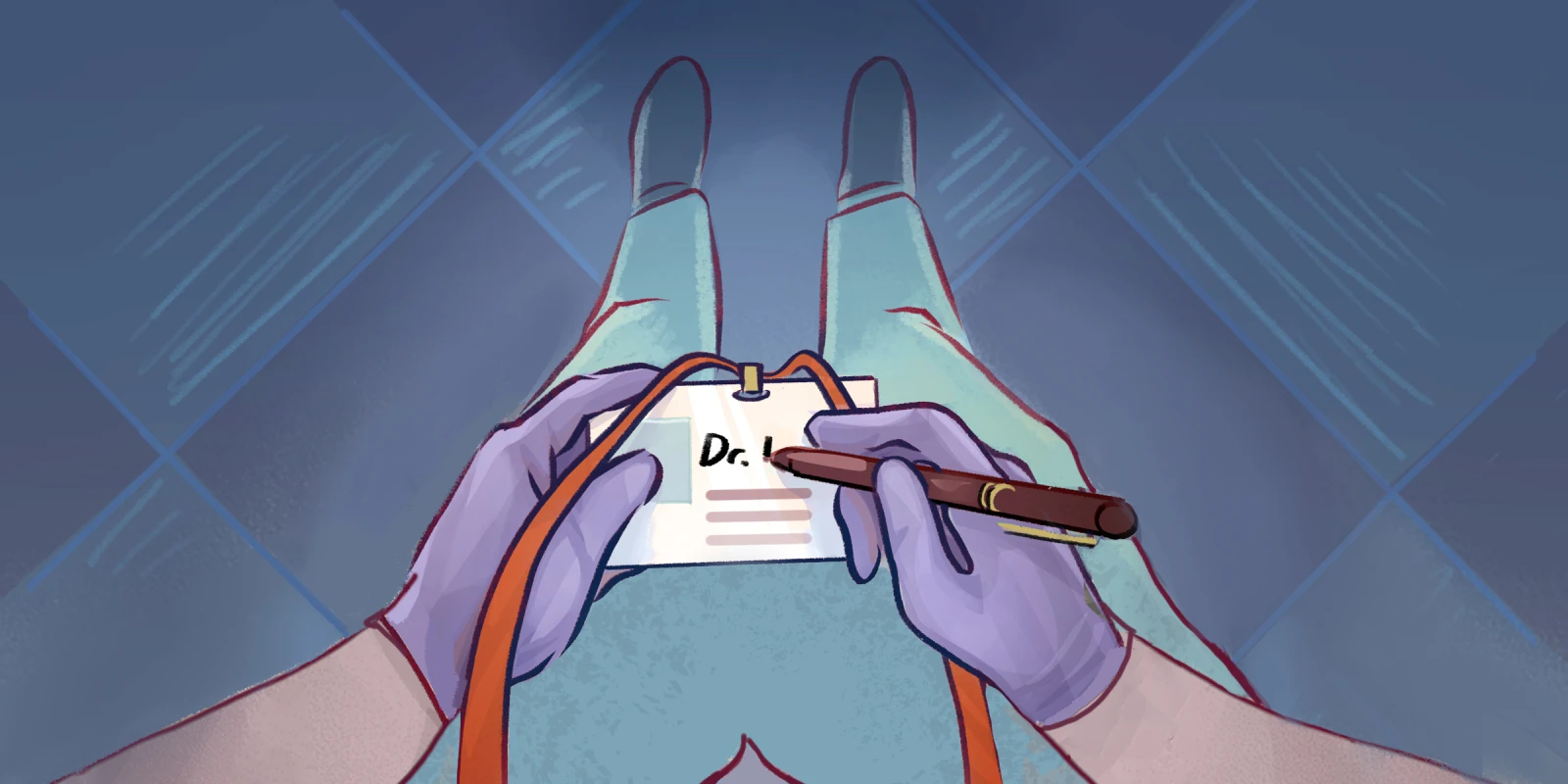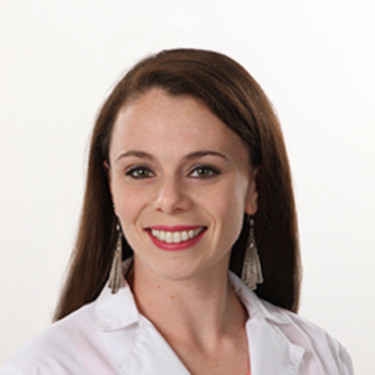One Saturday morning, I was lying in bed mentally planning my day. I had an afternoon shift in the ED, and beforehand, a stranger was coming by to pick up a piece of furniture I was selling online. I recall going through an unnecessarily lengthy decision-making process about whether to put on scrubs right away because wearing scrubs would inevitably lead to an uncomfortable Q&A about my job with the random Facebook Marketplace furniture buyer. I ultimately decided it would be a waste of time to change clothes, purely to avoid an awkward comment, and elected to put on my scrubs. Low and behold, random Facebook Marketplace lady immediately asked me if I was a nurse while I helped load a carpeted cat tree into her trunk. In this singular instance, it was a perfectly harmless question; however, I had predicted it, and even devised a mildly inconvenient and time-consuming strategy to avoid it entirely because there is genuinely no good response to this question. The mental gymnastics of deciding how to politely correct someone’s false assumption, that is rooted in sexism, without being offensive to that person or to the nursing profession, is exhausting, particularly when it occurs every single day.
As an American woman physician, I experience persistent sexism from both colleagues and patients. Daily, I am mistaken for a nurse, ostensibly because of my gender. However, for the past month, it hasn’t happened once. This month, I’m working clinically in Rwanda. Wearing my scrubs in the grocery store, a clerk asked me where I worked as a doctor and then thanked me for "saving lives." His friendly comment made a surprisingly profound impact on my mood. For once, I did not have to stop and explain that, no, I'm not a nurse; in fact, I am a doctor. I did not have to fight an internal struggle with the self-perception that I am being elitist by correcting the 800th person to presume I am a nurse because I am a woman wearing scrubs.
It's impossible for me to know what it would feel like to be a male doctor in the U.S., though I always imagined it would feel easier than it is to be a woman in medicine. In Rwanda I am only referred to as “doctor” or “senior,” and it's very empowering. I’m working in a low-resource hospital in a low-income country, taking care of incredibly sick patients, facing profound ethical challenges — e.g., deciding which of two dying patients gets the one remaining ventilator — yet, I feel somehow lighter. I don’t feel obligated to defend myself or my role as a physician. I feel freed from the cognitive burden of convincing others I am qualified to do my job. I feel more confident in my medical decision-making and in my conversations with patients and their families. I can teach students without second-guessing my every word. My impostor syndrome has distinctly improved.
It’s a unique position, to serve as my own control in this cross-cultural experiment, as my behavior and appearance are unchanged, but my treatment is drastically different. I previously blamed myself, thinking maybe it's my fault I don't garner the respect of a male physician — my voice is too small, I'm too short, I don't carry myself with authority, or my scrubs are the wrong color. In the U.S., when I’ve complained to male colleagues about gender discrimination, like when the techs hand all the EKGs to the male student for signing instead of me, the attending, the response has typically been, “How do you know it’s a gender issue?” An impossible question to answer, as most people don’t readily admit to being misogynists. I can only know my lived experience, which is a pattern of being mistaken for a nurse more often than I am called doctor. In Rwanda, working with three other EM physicians who are women, we've all independently felt surprised and gratified by an immediate assumption that we are physicians.
The head of the EM department at the hospital I am practicing in is an incredibly kind, compassionate, and intelligent woman of approximately my age. I asked her if she experiences gender discrimination in her work. Her immediate answer was no, but with some probing, she was able to list a total of three occurrences where she perceived sexism from patients. The most egregious of which was when a patient requested a male physician instead of her. In telling me her story, she was able to easily disregard the encounter as a one-off bad experience that was a problem with the patient and not with her. Furthermore, she said she has never felt discrimination from her colleagues who are men, only support. By contrast, I keep a therapeutic journal of my most upsetting gendered injustices from work. My first year of entries certainly exceeds the number of shifts I worked. I can only dream of being able to count them on one hand.
The Rwandan medical students I am working with are mostly in their early 20s, born after the genocide. Their class is about two-thirds women because, over the past two decades, the government has made a concerted effort to encourage more women to enter science and medical professions. They have partnered with groups like the Organization for Women in Science for the Developing World and the Forum for African Women Educationalists to put on seminars, create outreach programs, and develop initiatives that encourage women to enter STEM fields. In fact, Rwanda’s new constitution (2003) mandates that 30% of elected positions in decision-making governmental bodies are women, which has resulted in Rwanda becoming the first country in the world to have a female majority Parliament (61%). This political and cultural shift has led to a greater national sense of gender equity, which, for my 20-something-year-old medical students, is their normal. The bright young female medical students I informally interviewed all denied experiencing gender discrimination during their professional journeys. They do still feel pressure to get married and have children, but not in lieu of pursuing their careers. The students were shocked to hear about American women physicians’ inequitable treatment and even more surprised to hear that it didn’t improve for me significantly as I progressed from student to resident to fellow to attending. They hypothesized that their white coats were undeniable signposts identifying them as doctors-in-training, though none of the visiting faculty, including myself, have worn white coats and we are still presumed doctors. Another theory was that the word for doctor and nurse is the same in Kinyarwanda — muganga — and perhaps patients don’t recognize there is a difference between doctors and nurses. But the other health care staff all address me as doctor.
Maybe what I am experiencing is some type of “foreign doctor privilege” a la “white male privilege,” but maybe this is what it feels like to work in an environment that values human equality. Regardless, this is probably the closest I will ever come to knowing what it feels like to be a male physician in my home country, and I have to say, it is making me a better doctor. The absence of patients and colleagues questioning my role in the hospital has allowed me to stop questioning my validity as a physician. The lack of cumulative microaggressions has lifted my spirit and provided me with a greater sense of fulfillment in my work. This month, I can carry the confidence of a male physician and maintain my own humility. This month, I am the doctor I anticipated I would become.
What have you experienced as a doctor outside of your home institution? Share in the comments.
Dr. Jenny Jones is a global emergency physician in Massachusetts. She enjoys dancing, aerial arts, and drawing silly anecdotal cartoons. She is a 2023–2024 Doximity Op-Med Fellow.
Illustration by April Brust







